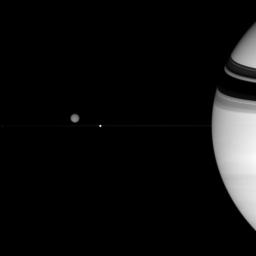
|
Trio Near the Rings
- Click the image above for a larger view
- Full-Res JPEG (1020 x 1020) (19.7 kB)
- Full-Res TIFF (1020 x 1020) (1.0 MB)
Caption:
Three of Saturn's diverse family of moons are captured in this view.
Smoggy Titan (5,150 kilometers, or 3,200 miles across) hovers above the thin line of the rings. Much smaller Epimetheus (116 kilometers, or 72 miles across) is a mere speck at far left. Bright Enceladus (505 kilometers, or 314 miles across) sits directly in front of the ringplane from the Cassini spacecraft's vantage point.
Saturn's rings cast dark shadows onto its northern hemisphere. As the planet approaches equinox in 2009, the shadows will get closer and closer to the equator and shrink in extent, eventually to emerge in the Southern Hemisphere.
The image was taken in visible light with the Cassini spacecraft wide-angle camera on July 23, 2007. The view was acquired at a distance of approximately 1.4 million kilometers (889,000 miles) from Saturn. Image scale is 82 kilometers (51 miles) per pixel.
Background Info:
The Cassini-Huygens mission is a cooperative project of NASA, the European Space Agency and the Italian Space Agency. The Jet Propulsion Laboratory, a division of the California Institute of Technology in Pasadena, manages the mission for NASA's Science Mission Directorate, Washington, D.C. The Cassini orbiter and its two onboard cameras were designed, developed and assembled at JPL. The imaging operations center is based at the Space Science Institute in Boulder, Colo.
For more information about the Cassini-Huygens mission visit http://saturn.jpl.nasa.gov/home/index.cfm . The Cassini imaging team homepage is at http://ciclops.org .
Cataloging Keywords:
| Name | Value | Additional Values |
|---|---|---|
| Target | Saturn Rings | Enceladus, Epimetheus, Saturn, Titan |
| System | Saturn | |
| Target Type | Ring | Planet, Satellite |
| Mission | Cassini-Huygens | |
| Instrument Host | Cassini Orbiter | |
| Host Type | Orbiter | |
| Instrument | Imaging Science Subsystem (ISS) | |
| Detector | Wide Angle Camera | |
| Extra Keywords | Grayscale, Shadow, Visual | |
| Acquisition Date | ||
| Release Date | 2007-08-29 | |
| Date in Caption | 2007-07-23 | |
| Image Credit | NASA/JPL/Space Science Institute | |
| Source | photojournal.jpl.nasa.gov/catalog/PIA09016 | |
| Identifier | PIA09016 | |
